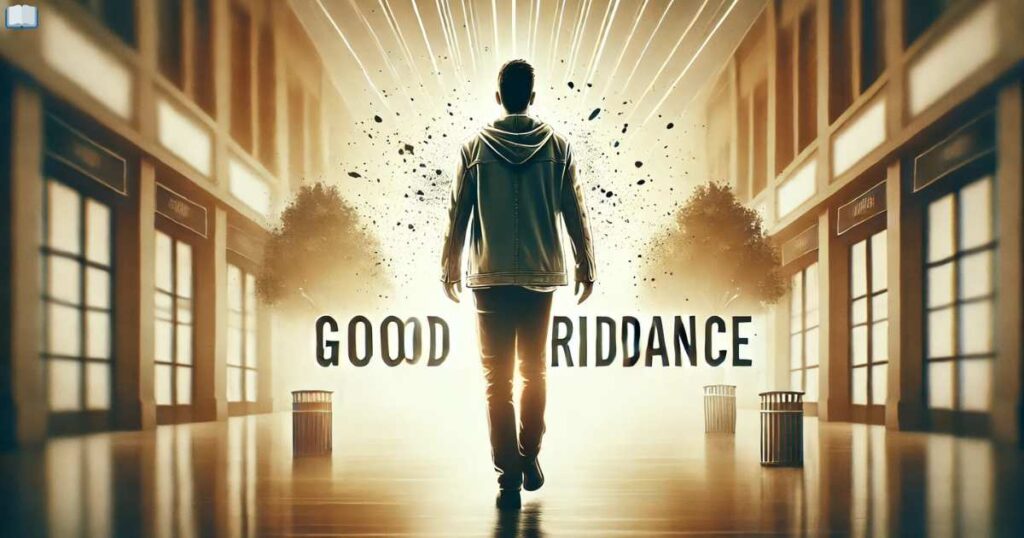Good riddance” is a phrase many of us have heard or used, often when expressing relief over the departure of something or someone unwanted. But what is the meaning of good riddance, and where did it originate? How has it evolved over time, and what role does it play in modern culture?
This article explores the history, meaning, and contemporary relevance of “good riddance” in 2025, from its Shakespearean origins to its presence in everyday speech, literature, music, and even social media trends.
1. The Meaning of Good Riddance

At its core, “good riddance” is an exclamation of relief, used when something undesirable is gone. The phrase suggests that whatever or whoever has left was causing frustration, inconvenience, or negativity.
Definition and Usage
- Definition: A phrase used to express happiness or relief that something unpleasant has ended or someone annoying has departed.
- Example: “My rude neighbor finally moved out. Good riddance!”
- Synonyms: Farewell and good luck (sarcastically), glad to see the back of, don’t let the door hit you on the way out.
While often used in personal situations, “good riddance” has broader applications, including politics, entertainment, and pop culture.
2. Historical Background: Where Did “Good Riddance” Come From?

The phrase dates back centuries, first appearing in William Shakespeare’s Troilus and Cressida (1602), where it was used to dismiss something unimportant. Over time, its meaning sharpened into an expression of relief.
| Era | Usage & Meaning |
| 1600s (Shakespearean Era) | Used in literature as a phrase to express dismissal. |
| 18th-19th Century | Became common in everyday speech, used in personal conflicts. |
| 20th Century | Gained popularity in pop culture, movies, and literature. |
| 21st Century | Widely used in digital communication and social media. |
By 2025, the phrase continues to thrive in conversations, memes, and online trends, often reflecting society’s changing attitudes toward toxicity and self-care.
3. Modern Usage and Cultural Impact in 2025

In today’s world, “good riddance” is more than just a casual phrase—it represents a mindset. People use it in various contexts, from personal relationships to global events.
How “Good Riddance” is Used in 2025
- Social Media: Hashtags like #GoodRiddance trend when people collectively celebrate the end of something (e.g., bad trends, failed policies).
- Entertainment: References in TV shows, music, and viral videos reinforce its presence in pop culture.
- Mental Health & Self-Care: More people embrace the “good riddance” mentality to remove toxic influences from their lives.
Famous Examples of “Good Riddance” in Pop Culture
- Green Day’s Song (“Good Riddance (Time of Your Life)”) – A bittersweet anthem about moving on.
- Celebrity Feuds & Breakups – Headlines often use “good riddance” when public figures split or leave toxic situations.
- Political & Social Movements – Used to signify the rejection of outdated policies or figures.
4. Psychological and Social Effects of Saying “Good Riddance”

Saying “good riddance” isn’t just about words—it’s about emotional release. Letting go of negativity can have profound psychological benefits.
Why People Love Saying “Good Riddance”
✅ Empowerment – Cutting ties with negativity feels liberating.
✅ Closure – Helps people move forward without guilt.
✅ Community Connection – Shared frustration over a common issue brings people together.
However, while it can be satisfying to say, it’s essential to use it appropriately. Being too dismissive may harm relationships.
5. Good Riddance” in Workplace Culture

In professional environments, the phrase “good riddance” often emerges when employees leave toxic workspaces or difficult colleagues exit. It signifies relief from negativity that hinders productivity and morale. For instance, when a domineering manager resigns, team members might express a collective “good riddance,” signaling a fresh start.
However, it’s crucial to approach such moments with balance. While celebrating the departure of negativity, maintaining professionalism is essential. Gossiping or openly mocking someone’s exit can create a hostile atmosphere, defeating the purpose of positive change.
6. The Role of “Good Riddance” in Personal Growth
Saying “good riddance” isn’t just a verbal reaction—it’s often a step toward personal growth. When people let go of toxic relationships or unhealthy habits, they embrace change for self-improvement. This mindset shift enables individuals to prioritize their mental and emotional health.
Acknowledging when it’s time to say “good riddance” can be empowering. It requires self-awareness and courage to cut off negativity. Whether it’s breaking away from a harmful friendship or leaving a draining job, this phrase symbolizes the end of something that no longer serves a positive purpose.
7. Good Riddance” and Digital Detox

In the digital age, people increasingly say “good riddance” to social media platforms or online negativity. Cyberbullying, online trolling, and comparison culture lead many to take breaks or permanently leave certain apps. This departure is often celebrated as a necessary detox for mental peace.
Moreover, people recognize that not all online spaces are healthy. Unfollowing accounts that trigger anxiety or deleting apps that waste time reflects the idea of a digital “good riddance.” By controlling their virtual environment, individuals can regain focus, confidence, and inner peace.
8. Good Riddance” in Global Contexts
On a broader scale, “good riddance” appears in global discussions and social movements. Countries often use the term metaphorically when rejecting outdated policies, corrupt leaders, or harmful practices. For example, the removal of oppressive laws or dictators is met with a collective “good riddance” by citizens seeking justice.
This usage also applies to environmental issues. When harmful practices like excessive plastic use or deforestation are banned, environmentalists express “good riddance” to practices that damage the planet. The phrase becomes a declaration of progress toward a better future.
9. When Not to Say “Good Riddance”
While “good riddance” can be empowering, it’s essential to consider its impact. Using it impulsively or in sensitive situations can come off as insensitive. For instance, dismissing someone’s departure from a shared space without understanding their perspective can deepen conflicts.
Being thoughtful about saying “good riddance” helps maintain empathy. Not every departure or ending requires such a strong reaction. Sometimes, silence or a more measured response shows maturity and respect, keeping relationships intact while still allowing personal boundaries.
Conclusion
The Meaning of Good Riddance: History, Usage, and Cultural Impact in 2025 shows how a simple phrase can reflect a complex blend of relief, empowerment, and change. Whether it’s saying goodbye to toxic influences, unhealthy habits, or outdated norms, “good riddance” serves as a powerful way to reclaim peace and growth.
In a world increasingly focused on mental well-being and positive environments, knowing when to say “good riddance” has become a valuable skill. It symbolizes the courage to move forward, embrace self-respect, and prioritize what truly matters. This evolving expression continues to impact our lives, offering both closure and fresh starts.
FAQ’s
1. What does “good riddance” actually mean?
“Good riddance” is a phrase used to express relief or happiness that something unwanted has ended or someone unpleasant has left. It reflects a sense of freedom from negativity or trouble.
2. Where did the phrase “good riddance” originate?
The phrase dates back to the early 1600s and first appeared in William Shakespeare’s Troilus and Cressida. Over time, it has evolved to reflect a more pointed sense of relief from unwanted situations.
3. How is “good riddance” used in modern culture?
Today, “good riddance” is used in everyday conversations, social media, and pop culture. It appears in memes, online discussions, and even global movements to reject negativity or outdated practices.
4. Is it always appropriate to say “good riddance”?
No, it’s essential to use the phrase carefully. While it can feel empowering, using it insensitively or without considering others’ feelings may come off as harsh or dismissive.
5. Can “good riddance” be a positive phrase?
Yes! While it often expresses relief, it can also symbolize personal growth and self-respect. Letting go of toxic influences or unhealthy habits can be a positive and empowering experience.

My name is Razzaq, and I have been writing about Bible verses and prayers for a long time. My deep understanding of these topics allows me to create high-quality content. The information I provide is always 100% accurate, ensuring that readers receive reliable and valuable insights.

